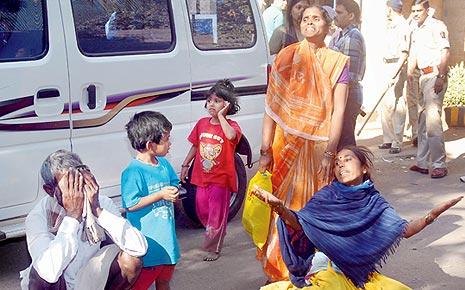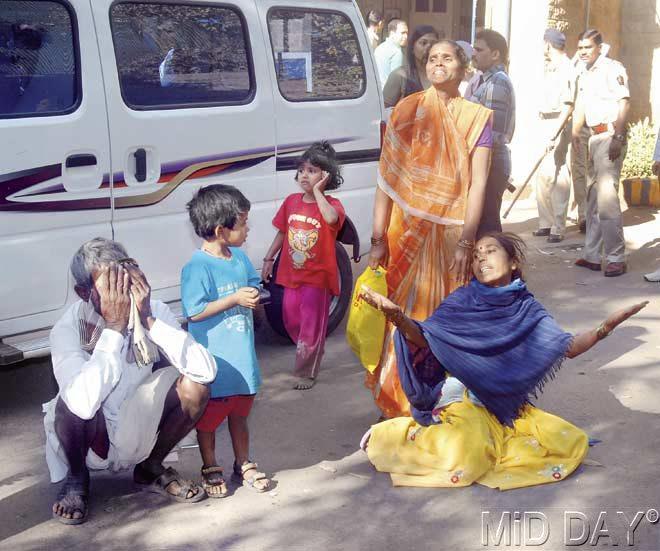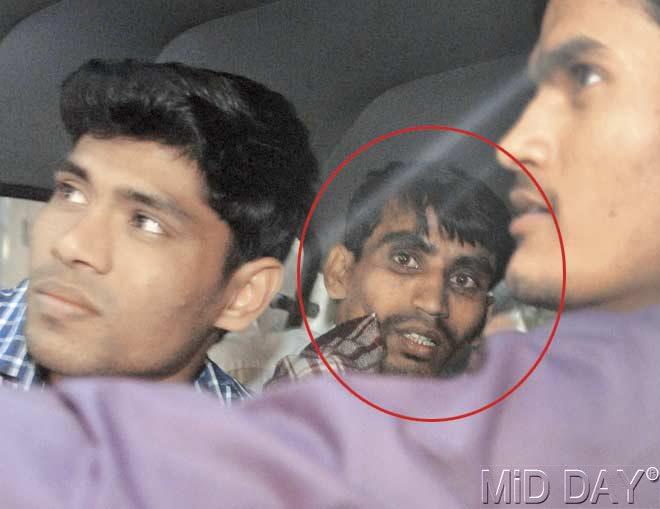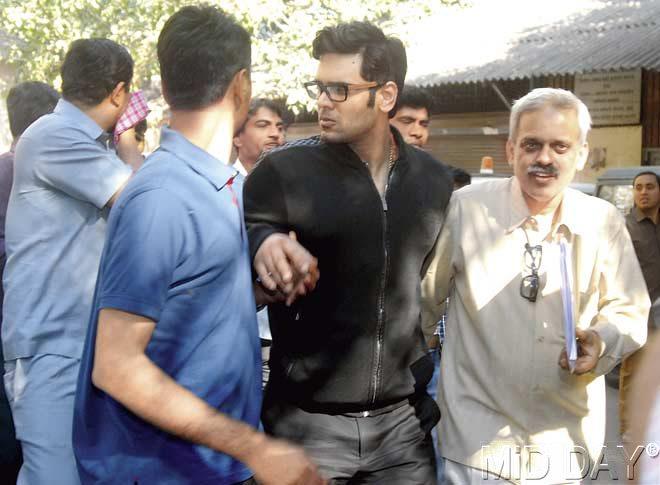Dharmu Rathod, peon of a top Yash Birla group executive, was found in possession of 4.5 grams of cocaine; wife says he cannot afford such an expensive addiction and alleges he is being framed

When the Narcotics Control Bureau (NCB) arrested a top executive of the Yash Birla group, Anant Vardhan Pathak, for possession of cocaine, they also put two of his aides behind bars. One of them, his peon Dharmu Ramu Rathod, was found in possession of 4.5 grams of cocaine.
ADVERTISEMENT
His family members, however, allege that Rathod is being made a scapegoat in the case. Adding weight to their claims is the fact that Rathod earns a mere Rs 10,000 each month from his boss. The total cost of the consignment is Rs 40,000 which comes to approximately Rs 9,000 a gram.

Family of Dharmu Rathod (circled) outside court, where the accused were produced yesterday. Pics/Shadab Khan
The arrests took place after the Income Tax (I-T) Department conducted some searches on various offices of the Yash Birla group for suspected tax evasion.

Dharmu Ramu Rathod being produced in court
The cocaine was discovered on Friday night, when the officers were rummaging through room 667 at the Taj Mahal Palace on Apollo Bunder, which had been booked in the name of 31-year-old Pathak, who is group president for Corporate Affairs and Corporate Communications in the Yash Birla group. Rathod was accompanying Pathak at the time. The I-T department conveyed the information to the NCB, and the arrests followed.

Anant Vardhan Pathak (in black) was produced in court where he was represented by lawyer Parvez Memon. Pic/Shadab Khan
During interrogations, Rathod told the police that Dilip Palekar, Pathak’s personal security officer who was also arrested, gave him the drug. Investigations revealed that Pathak had bought the consignment from a local drug dealer for Rs 40,000. Rathod’s family members allege that he has been made a scapegoat, and that there is no way in which he could have gathered the means to purchase such a costly drug, when his salary for an entire month amounts to Rs 10,000.
His wife Shanti said, “We are poor people. We cannot afford to have such expensive addictions. His salary is just Rs 10,000. How can he buy such expensive drugs?” Shanti added, “He has never consumed cocaine. He had even quit the job some months ago, but Pathak called him back, luring him with a raise. What will we eat when my husband, the lone breadwinner of the family, has been sent to jail? I have four kids and the entire house to look after.”
Rathod’s family could not even afford the services of a lawyer. An advocate, Naresh Rathod, who hails from his native state of Karnataka, agreed to represent him, free of cost. “My client has only followed his boss’ (Pathak’s) orders. He does not have food to eat at home, and has four kids staying in a slum in Cuffe Parade. How can he consume cocaine, such an expensive drug? Everybody is trying to frame him, and that’s why the cocaine was also shown in his possession,” said the advocate Naresh Rathod.
Punishment
While the possession of 2 grams of the drug is considered to be in the non-commercial category, possession of anything between 2 and 100 gms is recognised to be ‘commercial’ in nature. Under the Narcotic Drugs and Psychotropic Substances (NDPS) Act, the possession and purchase of more than 2 grams but less than 100 grams of cocaine is punishable with rigorous imprisonment of up to 10 years, and a fine of up to Rs 1 lakh.
“They will now try to prove that there were three people who were trying to consume the drug, to make it fall under the non-commercial category and reduce the quantum of punishment meted out to each. Or they will put the whole blame on my client,” the advocate added. “The accused are in our custody and we are investigating further,” said Rohit Kathiyar, zonal director, NCB. Preliminary investigations undertaken by the NCB have revealed that the cocaine was purchased for Rs 40,000 from an unidentified dealer, whom they are searching for.
 Subscribe today by clicking the link and stay updated with the latest news!" Click here!
Subscribe today by clicking the link and stay updated with the latest news!" Click here!






